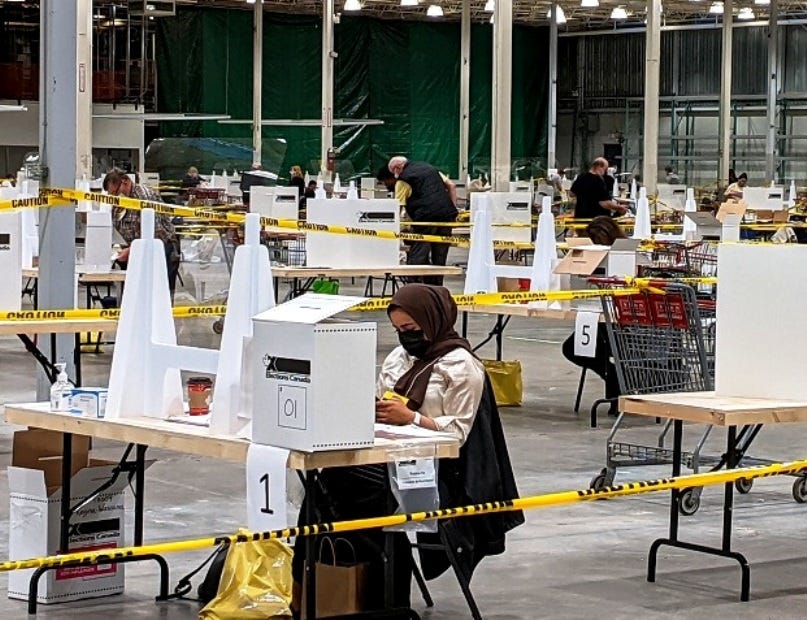There Is No Popular Vote
Elevating geographic representation over other forms of representation is a feature not a bug.
Photo: Logan Stein, 980 CJME
Canada observed its forty-forth general election last month, the prime minister’s new cabinet was sworn in last week, and parliament is scheduled to open in late November. Canadians are once again free to revel in the virtues of Confederation by regarding the business of national government with polite indifference.
Well, not quite. The government finds itself with a minority virtually indistinguishable from the one it held going into the election and will have to press its luck again sooner than later. Before we surrender the national narrative to months of idle speculation, let’s take advantage of this time to dispel the curious but irresponsible notion that the “popular vote” plays any formal role in our electoral system.
The fact that a party can capture the most votes in a general election and not win is often cited as proof that our electoral system is broken. So, too, the fact that a party’s total vote rarely reconciles with seats won. We find both trends in our recent election: the Liberals won despite capturing fewer votes than the Conservatives (32.6% versus 33.7%), the Bloc secured seven more seats than the NDP (with only 7.6% compared to 17.8%), and the People’s Party earned no seats at all despite earning 4.9% overall.
There is something broken here but I would argue that it is our expectations of the system and not the system itself. A general election in Canada is not a single contest but 338 simultaneous contests resolved by a winner-take-all rule: win the most votes, win the seat; win the most seats, win the election. The vote can be aggregated to determine overall national participation, which can then be used to project vote “share” per party, but it has no actual impact on the outcome in our electoral system.
If the popular vote has no formal role in our electoral system then why are we so invested in it?
I can think of five reasons. The first is that elections are framed by the media and nuance makes for poor entertainment. Worse, as Daniel Weinstock notes in Should We Change How We Vote?: “After elections, analysts will often misleadingly calculate how the parties contesting the election would have done under another electoral system.” Playing the “what if?” game allows pundits to fill air time and those who did poorly to save face. Canadians also consume a high volume of American media and our neighbours are just as confused about the role of the popular vote in their own electoral system.
The second reason is that we are good at building a story by making connections between points, as Nassim Nicholas Taleb observes in Fooled By Randomness, but less good at asking whether those connections have value or should be made at all. When we complain that our vote did not “count” because our preferred candidate did not win, or that the election was “rigged” because the party that won did not capture the most votes, we are making connections to points that are not true or relevant in context.
The third reason is that it is easy to forget that we do not have a direct democracy. Especially when the spirit of the age is self-empowerment and making yourself heard. After all, the technological capacity to express an opinion about anything at any time has encouraged us to do just that. Is it any wonder we see legitimacy in what feels like a pure expression of popular will?
The fourth reason is that we ignore what our electoral system does value (geography) and what it is actually designed to do (let each riding answer the electoral question for itself). Elevating geographic representation over other forms of representation is a feature not a bug. Our electoral system is focused on geography for a reason and we owe more to its role in forging and maintaining our identity than we perhaps realize.
The fifth reason is that there is no popular vote but there could be. It plays a role in many viable alternative electoral systems that we are free to adopt should a clear and conscionable consensus prevail. Yet it is also true that advocates can be opportunistic—at least to the extent that they oversimplify, minimize risk, and almost always stand to gain from an alternative. In general, the only problem they aim to solve is securing political advantage. Institutional evolution is healthy but so is change for the right reason.
For a people preoccupied with threats to our democracy of late, we ought to spend less time eroding institutional trust by calling our system broken. We lose nothing in reminding ourselves that there is no popular vote. In fact, what we stand to gain is a simpler relationship with government and that's not something you get to say every day.





